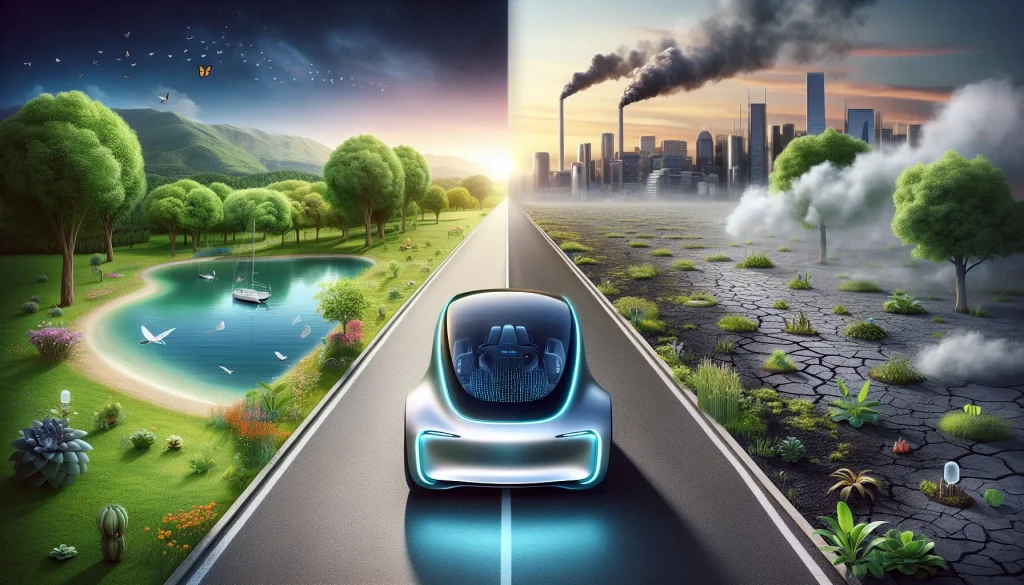Autonomous vehicles are poised to revolutionize transportation, but their environmental impact remains a subject of debate. This article presents insights from leading experts on the potential ecological effects of self-driving cars. From reducing vehicle production to reshaping urban transit, discover how AVs could influence our planet’s future.
- Autonomous Fleets Reduce Vehicle Production
- AVs Reshape Urban Transit Efficiency
- Self-Driving Cars Smooth Traffic Flow
- Smart Routing Eliminates Unnecessary Trips
- Battery Recycling Crucial for AV Sustainability
- Balancing AV Benefits with Urban Sprawl
- Efficient Driving vs Increased Vehicle Use
- AVs Energy Demands Challenge Environmental Gains
Autonomous Fleets Reduce Vehicle Production
For me, the environmental impact centers on manufacturing reduction rather than the vehicles themselves. Autonomous fleets will operate 12-16 hours daily versus personal cars sitting idle 95% of the time, meaning one autonomous vehicle can replace 8-10 privately owned cars through efficient routing and continuous operation.
In our salvage operations, we’ve noticed ride-share vehicles accumulate 80,000-120,000 miles annually compared to 12,000 miles for typical personal vehicles, yet their lifespan in service is only 3-4 years versus 12-15 years for personal cars. However, the math works heavily in favor of resource conservation since those high-utilization vehicles prevent the manufacturing of multiple personal vehicles, dramatically reducing steel, aluminum, and rare earth mining demands.
The shift toward shared autonomous fleets could reduce global vehicle production by 60-70% while maintaining equivalent transportation capacity. This represents the largest potential environmental benefit through efficiency rather than just electrification. The real environmental win comes from needing fundamentally fewer vehicles requiring raw materials extraction, manufacturing, and eventual disposal rather than simply switching energy sources.
 MARC SKIRVIN
MARC SKIRVIN
President, Cash Auto Salvage
AVs Reshape Urban Transit Efficiency
A couple of months ago, one of our clients missed their flight while participating in a poorly coordinated autonomous shuttle trial at Mexico City Airport – ironically, in the name of progress. That moment sparked several realizations… that merely implementing technology cannot improve transportation without a deep local understanding.
As the owner of Mexico-City-Private-Driver.com, I have direct experience where environmental footprint is not just about emissions… it is about how technology affects urban flow. Autonomous vehicles (AVs) might help improve social good by reducing customers’ environmental footprints through improving traffic efficiency and decreasing the number of cars on the street, especially if AVs go fully electric. The challenge with a city like ours, with a dense informal transit system (taxi, buses, rideshare, etc.), and irregular existing infrastructure, is that AVs might initially make emissions worse – particularly on the traveler’s first road trip experience. The navigation for the real world requires continuous recalculating, prolonged waiting time, and more energy used per mile, until it can adapt and know its new route.
That being said, I see more benefit in the long run with autonomous fleets that are centrally managed and intelligently routed, wherein the autonomous vehicles could reduce deadheading fares by up to 30% of vehicle miles, which, with an increased share and electrification, could decrease local transportation emissions by double digits.
To be clear: we still need a human layer; people that understand levels of local culture, language, safety, and shortcuts… which is why at Mexico-City-Private-Driver.com I lean into hybrid business models. I want to have a trained chauffeur as the operator over a semi-autonomous electric vehicle; trust does matter when we talk about leaning into autonomous technology. In the long run, the future will not be driverless, but a smarter, cleaner, and more human-aware transportation experience.
 Martin Weidemann
Martin Weidemann
Owner, Mexico-City-Private-Driver.com
Self-Driving Cars Smooth Traffic Flow
One environmental benefit I see with autonomous vehicles is the potential for much smoother traffic flow, which could cut tailpipe emissions even before the entire fleet goes fully electric. Self-driving cars can accelerate and brake more gradually, coordinate speeds through vehicle-to-vehicle communication, and avoid the accordion effect that wastes fuel in stop-and-go traffic. If cities pair that technology with dynamic ride-sharing, think robo-taxis that pick up multiple passengers on a single route, we could remove a significant number of privately owned cars from congested corridors and shrink the overall carbon footprint of daily commuting. The key will be policy: encouraging shared, electric autonomous fleets rather than thousands of individually owned self-driving cars roaming empty between trips.
 Javier Gutierrez
Javier Gutierrez
Owner, Northside Collision Paint & Body Inc.
Smart Routing Eliminates Unnecessary Trips
Running vending operations taught me something unexpected about autonomous vehicles and waste. Currently, our delivery vehicles follow the same routes whether machines need restocking or not because drivers cannot check inventory remotely. We end up with half-empty trucks making unnecessary trips, as well as machines that sit empty for days between scheduled visits.
Autonomous vehicles could completely change this scenario. Imagine smart vehicles that only dispatch when sensors indicate machines actually need products, then optimize routes in real time based on actual demand rather than guesswork. Last week, we had three trucks drive past nearly full machines while two locations sat empty because we adhere to fixed schedules.
The environmental benefit isn’t just from electric motors – it’s eliminating pointless trips. Start considering how autonomous systems could reduce waste in your own operations, not just replace drivers.
 Alexandru Samoila
Alexandru Samoila
Head of Operations, Connect Vending
Battery Recycling Crucial for AV Sustainability
From what I’ve determined, autonomous vehicles have a significant potential to reduce carbon emissions. Since they’re designed to optimize driving patterns and reduce unnecessary fuel consumption, they can play a substantial role in making transportation more eco-friendly. Additionally, many of these self-driving models are being developed as electric vehicles, which significantly reduces fossil fuel use.
However, one concern I have is about the increased production and disposal of batteries, especially for electric autonomous vehicles. These require rare earth elements and heavy metals, which can be harmful if not properly recycled. It’s crucial that as we move forward, there’s a solid plan for recycling these materials to minimize environmental damage. It’s always a good idea to keep a watchful eye on the entire production and disposal cycle, not just the end use, isn’t it?
 Alex Cornici
Alex Cornici
Marketing & PR Coordinator, Magic Hour AI
Balancing AV Benefits with Urban Sprawl
Self-driving cars might be the key to significant shifts in emissions and traffic jams, which are essential environmental aspects. The potential positive impact may include a decrease in the total number of emissions, particularly in the case of electric cars. In theory, self-driving cars may be more efficient than cars driven by humans, which may save fuel by optimizing driving behavior, including braking and accelerating. The overall impact of these technologies could be a potential 30% reduction in carbon footprints in cities if the fleet were electric.
However, a possible negative effect is the necessity of more road infrastructure. With the increasing popularity of autonomous vehicles, urban sprawl can be expected to grow in cities because of the ease of use of these vehicles. As we continue to push for new roads and additional urbanization, we might experience more land being cleared for development, which might counter some of the emission reductions. It will be necessary to balance the development of these technologies with sustainable urban planning so as not to add to the degradation of the environment.
 Allan Hou
Allan Hou
Sales Director, TSL Australia
Efficient Driving vs Increased Vehicle Use
One significant environmental benefit of autonomous vehicles is the potential for reduced fuel consumption. These vehicles can drive more efficiently than humans by maintaining steady speeds, avoiding harsh braking, and choosing optimal routes. This could result in less fuel burned overall, which is good news for reducing carbon emissions.
On the flip side, a concern is that if autonomous vehicles make travel easier and cheaper, people might use them more often instead of walking, biking, or using public transportation. This could lead to an increase in overall vehicle miles driven, resulting in more emissions and energy use, especially if those vehicles aren’t electric.
So, like with anything, it depends on how we implement and use the technology. If we combine autonomous vehicles with clean energy, ride-sharing, and smart city planning, it could be a win for the environment. If not, we might just see more traffic congesting our roads and polluting our oceans and air.
 Christopher Farley
Christopher Farley
Owner, Flippin’ Awesome Adventures
AVs Energy Demands Challenge Environmental Gains
Autonomous vehicles (AVs) present great potential in revolutionizing transportation, yet there are serious concerns about their environmental effects. Among the problems that are not widely discussed but are urgent is the possibility of higher energy consumption due to the complexity of AV systems. They require immense computing power, sensors, and constant data processing to operate safely and efficiently. Unless the electricity used to power AVs is obtained through renewable energy, the carbon footprint of using these vehicles may be greater than the environmental gains anticipated from the reduction of emissions of conventional vehicles.
On the other hand, AVs might lead to significant carbon emission cuts by streamlining driving habits and minimizing fuel use. Autonomous vehicles can also reduce the number of cars on the road by optimizing routes, minimizing congestion, and encouraging more efficient vehicle sharing through smart technologies. In the long term, the environmental advantages of AVs may greatly outweigh their energy requirements when combined with clean energy sources and renewable infrastructure. However, the challenge will be how to match this technological development with sustainable energy practices to maximize its long-term positive effect.
 Hugh Dixon
Hugh Dixon
Marketing Manager, PSS International Removals







